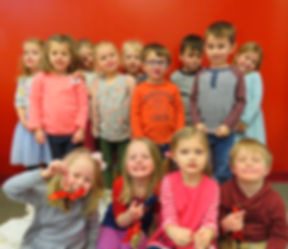

Faith.Family.Learning.
with Director, Suzie Stalter
At New Hope Preschool and Education Center, we believe in faith, family and learning. Please take a moment to read some thoughts below that support these three beliefs.
Autumn Explorations
October 22, 2019
Be kind, for everyone you meet is fighting a hard battle.
-Plato
“Pumpkins, gourds and squash make terrific pounding surfaces,” declare Sandra Duncan and Jody Martin in their popular book, Bringing the Outside In. “Once the gourd has a sufficient number of holes in it, take it to the garden or nearby forest for woodland creatures.” And, here’s another pumpkin idea, just in time for Halloween and/or Autumn explorations:
“Scoop the ‘guts’ from three to four large pumpkins and place in a shallow storage bin. Invite children to explore the ooey gooey seeds, fibrous strands, and pulp with their fingers or even their toes! Provide items such as measuring cups, mashers, and spoons to continue the discoveries.”
From ExchangeEveryDay | July 2, 2019
7 Reasons for Challenging Behaviors
What I'm looking for is not out there; it is in me.
-Helen Keller
On her website, consultant Rae Pica lists seven reasons she believes we are seeing more challenging behaviors in children lately. Here’s a synopsis of them:
Children have almost no time to play — something that early childhood researcher and professor Nancy Carlsson-Paige calls ‘nature’s plan’ and ‘a biological drive.’ Experts around the globe agree with this statement. Can you imagine if we insisted that kittens and puppies stay still? If we prevented them from frolicking and playing? The idea is ludicrous – and it should be just as ludicrous when we’re discussing children…
We are demanding that children accomplish things for which they are in no way developmentally equipped…
Children get little to no downtime...
We treat children as though they exist only from the neck up and that only their brains matter, when the research shows and good sense validates the importance of the mind-body connection…
We stifle children’s natural creativity and inherent love of learning through worksheets, standardized tests and curricula, and an insistence on conformity and rote — as opposed to active, authentic — learning…
We pit children against one another with our focus on competition and winning…
Too many children spend hours in front of screens, leading sedentary lives (it’s the sitting thing again) filled with virtual relationships instead of interacting with real people in real life – when the research clearly shows that social-emotional development is critical in early childhood and that in-person interactions are necessary for social-emotional development. Additionally, we have research demonstrating that screen time is creating depression and aggression in children…"
From ExchangeEveryDay | February 25, 2019
Play Supports Character Development & Ethical Behavior
I have learned over the years that when one’s mind is made up, this diminishes fear; knowing what must be done does away with fear.
-Rosa Parks
Writing in two companion books, Child Development andChild Development II (both Beginnings Workshop books), both David Elkind and Marjorie Kostelnik discuss how affording children true play experiences can support character development and concepts of ethical behavior.
“Character can be defined as the disposition to make socially responsible choices,” explains Elkind in Child Development II. “That is to say, we have the choice to be honest or dishonest, truthful or deceitful, compassionate or insensitive…The disposition to make socially responsible choices is not inborn and must be learned. When children have the opportunity to engage in true play, they are learning to consider options and make choices…Children who play their own games learn to take the other child’s point of view. True play thus encourages character building, problem solving, decision making and perspective taking skills.”
Marjorie Kostelnik, in Child Development, discusses the teacher’s role in supporting children’s ethical behavior during play experiences. Here’s one example she gives:
“Several children and their teacher are sitting in the block area discussing how to keep people safe while playing with the materials there. At the children’s direction, the adult prints on large poster paper:
Don’t throw blocks.
Watch out for toes.
Everybody picks up blocks at clean-up time.
The children display these ‘rules’ near the block shelf for everyone to refer to throughout the day.
Asking children to help establish the expectations they will live by is a common early childhood practice. It is also a strategy for modeling ethical behavior in the classroom.”
From ExchangeEveryDay | February 22, 2019
Immersive Sensory Experiences
"Education is for improving the lives of others and for leaving your community and world better than you found it. "
-Marian Wright Edelman
In her book, Really Seeing Children, Deb Curtis shares a story about the importance of encouraging children to become fully immersed in sensory experiences. Here’s part of the story, written with Jess Guiney and Sheena Wilton: “Jessica and Isabella were immediately drawn to the new chalk available on the patio…They began experimenting with different amounts of pressure as they filled in the space with chalk. Isabella worked slowly, noticing the brightness of her colors. Jessica worked quickly, examining the amount of chalk dust that was accumulating as she moved her chalk across the ground like a windshield wiper.
When Jessica pointed out how much colorful dust had gathered around them, Isabella was intrigued to go slowly and quietly to explore it. First, she moved a little pile around with one finger. Then, she swished her entire hand back and forth over the dust, mixing the colors together. Finally, Isabella blew the chalk dust across the cement, moving it in yet another way. After most of her work was beautifully blurred, she looked up and said, ‘It looks like a wish.'"



